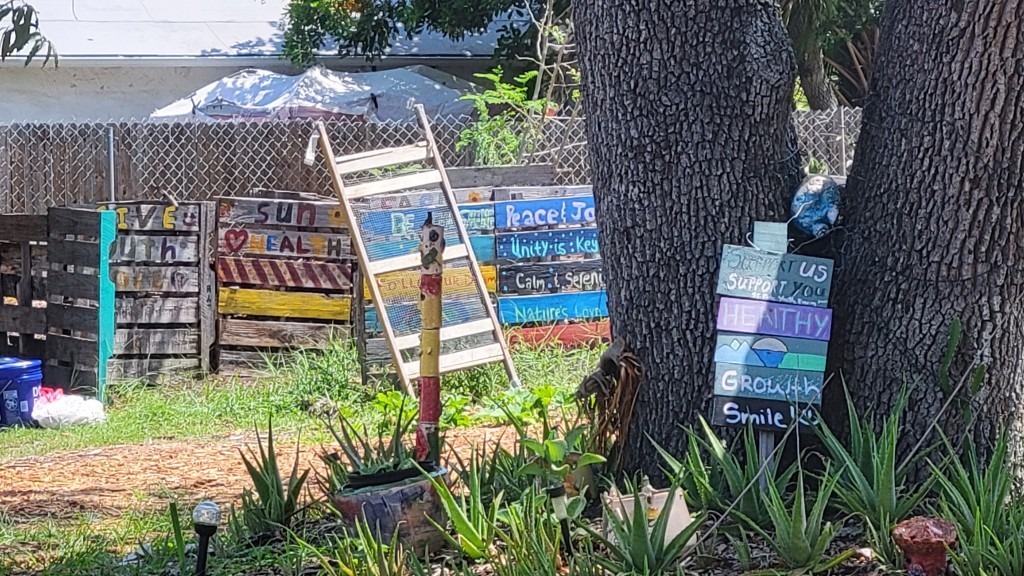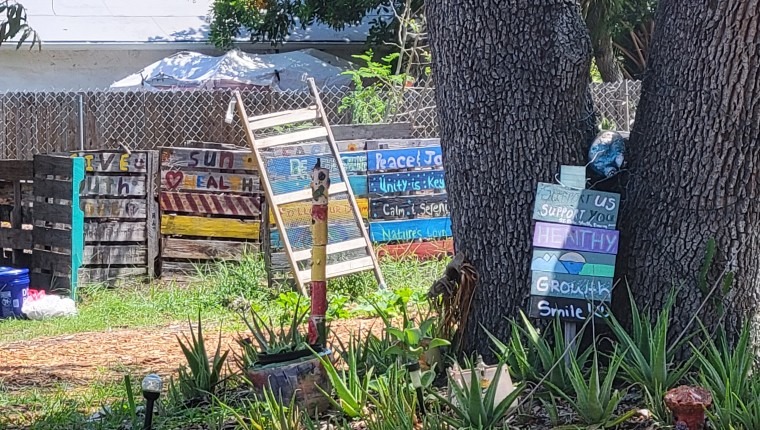. . .
When I arrived at St. Pete Youth Farm, I was met with a mural decorated with hand-drawn paintings of people and words – “The Enoch Davis Center” – the farm was tucked behind it.
A sweet man (Sandy) greets me, “Good morning! Are you here to see Carla?” while I notice the crates being carried by his pull-cart. He pointed to the one filled with yellow baby mangoes and a sign that welcomed anyone to have one.
I let him know that I had indeed arrived for Miss Carla Bristol, Collaboration Manager of the SPYF, and walked closer to the gate. Mangoes are a significant fruit in my childhood that brought security and happiness, so I knew, even before stepping into the farm, that this place would somehow echo those feelings back to me.
As I inched closer to Miss Carla and her lovely volunteers, she said hello and smiled so brightly. She noticed my sheer and open bee shirt with flowers stitched onto it – “Did you wear that for me for this interview? I love it.” Something about her comment told me I was welcome.

I wait for her under the beautiful tree that’s decorated with a charm and many other things like string lights, with a wooden circle-seat engulfing it. I watch her and the others work, and notice how much of a leader she is. Concise with her words, describing her visions vividly, and very knowledgeable in agriculture and so many other things.
Eventually, we sit together and are ready for the interview. We open with a personal note. “Light” is the main focus, and how it is such an important element in our lives no matter what we go through. She then tells me how her mindset is applied to the St Pete Youth Farm.
“One of the things we do now at the Farm is deliberate infusion of positivity. How we do that is every single morning. Our goal is to have standards for ourselves, which are sometimes standards that come from our family, which are then standards that could be upheld within our community.
“We are not representing just ourselves. That way, I’m teaching the young ones that they’re also representing the Farm with their conduct and behavior.”
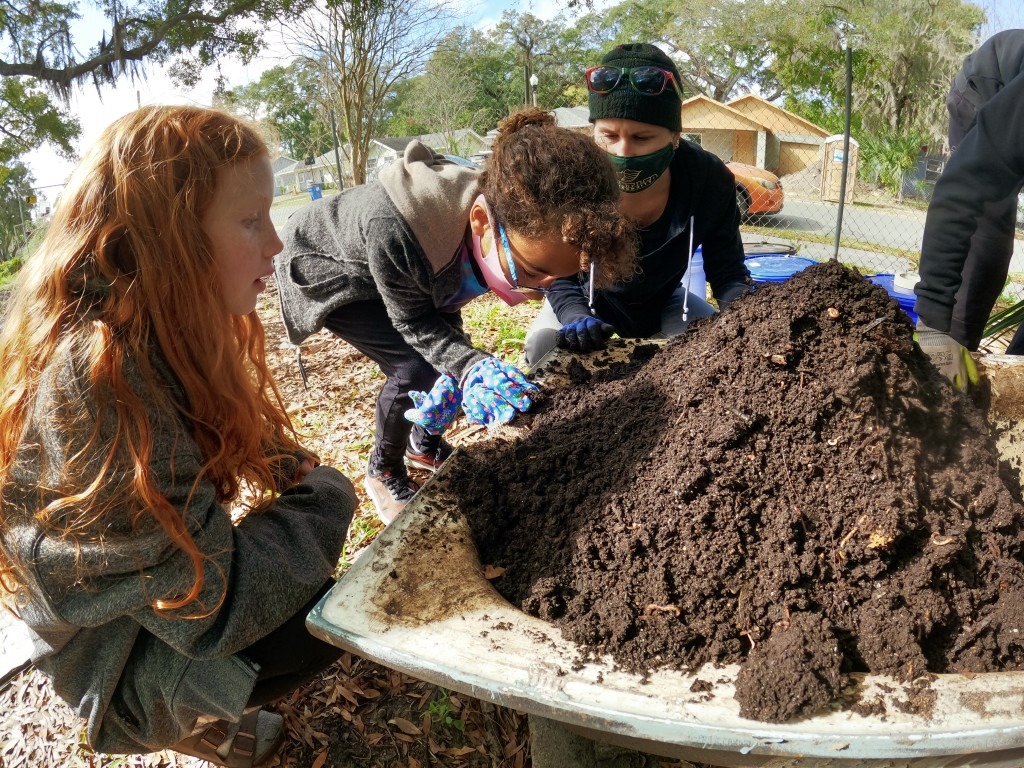
She opens her phone to group chats she has with the kids who come to help on the farm. The amount of positivity they share together as a daily activity is incredible! I love how she encourages visiting children and teenage Youth Ambassadors to share that positivity creatively with their parents and others.
This type of teaching creates a healthy environment that cultivates reciprocal respecting, self-preservation, and self-affirming habits that can be shared throughout the community, while also building high esteem within these young souls.
Everything on the Farm aside from tools and equipment is handmade and put together by the members and Miss Carla herself. The benches surrounding the decorated tree were assembled and painted by young people. Kids were encouraged to think of ways of using leftover wood to create seats even while they hesitated and didn’t have enough confidence.
Miss Carla kept the importance of solidifying great memories of achievement closely and assured them they were creative and had the heart to do it. She was right.
Heavy labor-based projects like the back garden’s archway next to the Nomad Art Bus, and the greenhouse, were left to the adults to work on. Everyone creates a creative and loving space through their hard work.

She breaks Cassava bread with me, a root grown in the gardens at the St. Pete Youth Farm, as we continue to discuss the Farm and our lives. We share each other’s cultures and family stories around the root because cassava is such a sustainable root vegetable that feeds the entire nation in our countries (Guyana and The Philippines, both having Indigenous roots).
Miss Carla shares most of her family and life story beyond this Cassava root to let me know where she’s come from – the roots up, so to speak. We share how much we appreciate communities we settle in, and partake in the local cultures, compared to how we as human beings sometimes forget to look at our homelands with observance and reverence for it all.
“Floridians don’t exactly see the beauty of their communities,” she says.
Miss Carla is an explorer and creates ideas in real-time by analyzing space and availability, which explains her story. She and I are extremely similar in that headspace. We don’t have cookie-cutter solutions to things in life, but problem-solving mindsets – and like getting to know the people we are connecting with.
“So teens (SPYF’s Youth Ambassadors) are paid $15 an hour to work here,” she explains. “And the thing about it is the work. The biggest part of our work, aside from providing for the community, is youth development. So our young people learn financial literacy.”
She tells me that a teen “who had by then 20-something felonies got appointed to me by a county commissioner for this teen’s community service hours. But it was the same teen that I let handle all my finances for the gallery when I started the Black Arts Festival. And most adults would have never treated that young person with respect, to the point where you could trust them. . . So it’s a different operation, the way we work. . .”
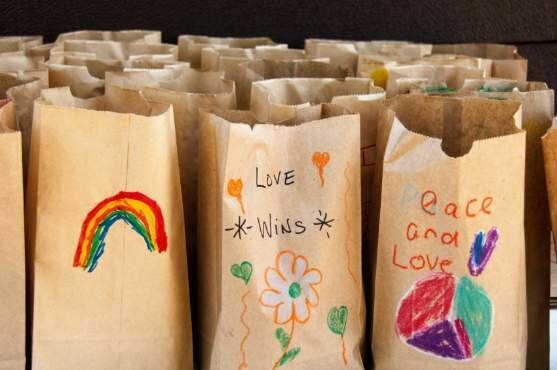
“We do Mental Health Mondays every single Monday for almost four years. Meaning mental health was something that we recognized right at the beginning of this place. This is important.
“We have to prioritize this because mental un-wellness was coming up in 33% of the teens that I was responsible for. And culturally, there was a stigma around it that wasn’t positive. So kids were saying, if you receive mental health support, you were crazy. And I was like, wow. Let me understand this – if I’m not well and I go to get help for not being well so I could be better, then that makes me crazy? I was like, okay, so now we’re all going to be getting help.”
“It’s part of the culture of the work we do. Just to make everyone, specifically parents, (know) that this will help your children with anxiety. It will help them with anger management. And anxiety is also critical when it comes to test taking. Everything we’re doing transfers into all other aspects of your life. We do public speaking, we do culinary. On Tuesdays, we cook. I mean, it was amazing because people talked about farm-harvesting to table.
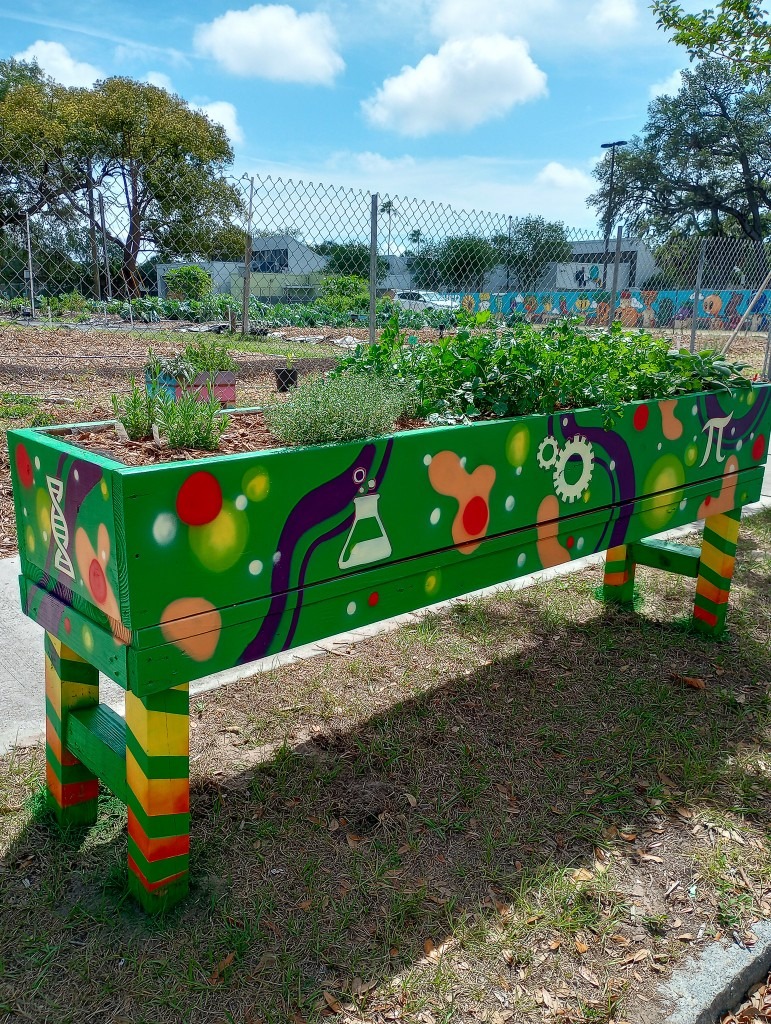
“We create 100% of our own soil now. There’s zero soil that’s brought in from the outside here. That’s what all that composting is.
“The irony is we started to address a lack of access to nutritious foods in this community. The very location where the Walmart closed is where we get so much of the produce that we compost. It’s just ironic that we are rescuing all this food that would go into the waste and we’re taking it and turning it into soil for us to grow food for the very community.”
I sit there listening to how she took the time to pay attention to young people’s development from the garden to the kitchen, and how they develop their cooking skills and their love for whole foods from their gardening work.
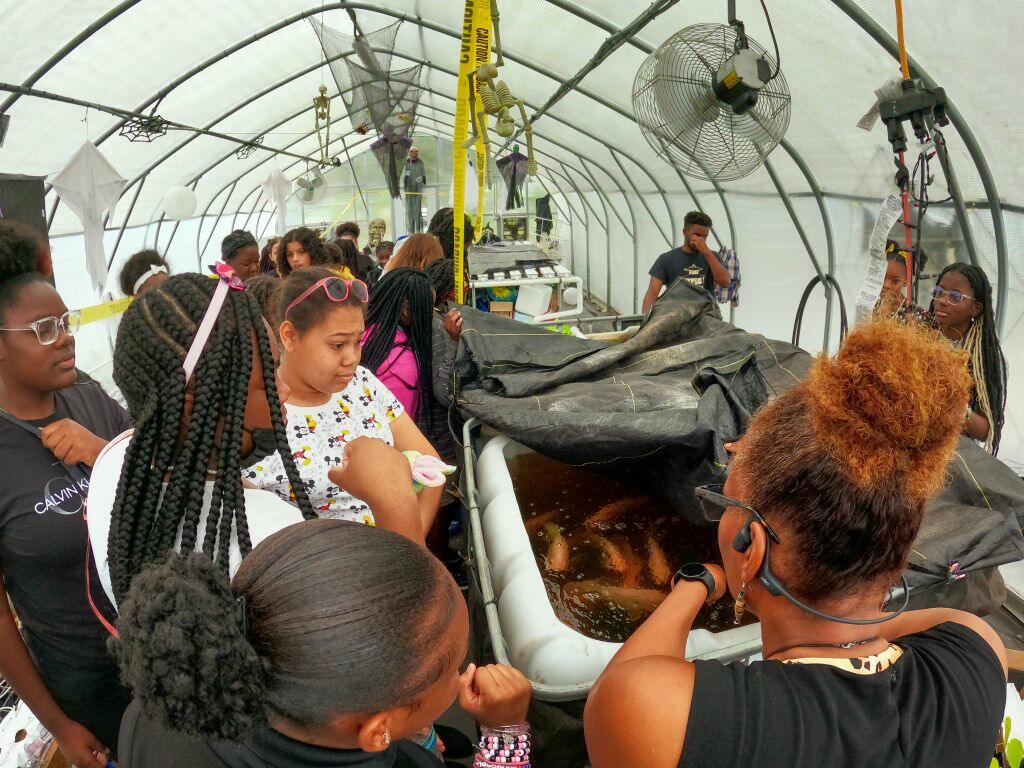
Keep in mind, this also includes the Tilapia Farm that Miss Carla included in the farm for visiting children and teen Youth Ambassadors to harvest since June 2022. They love eating Tilapia after understanding this species comes from Africa, when bad stereotypes surround the fish’s name.
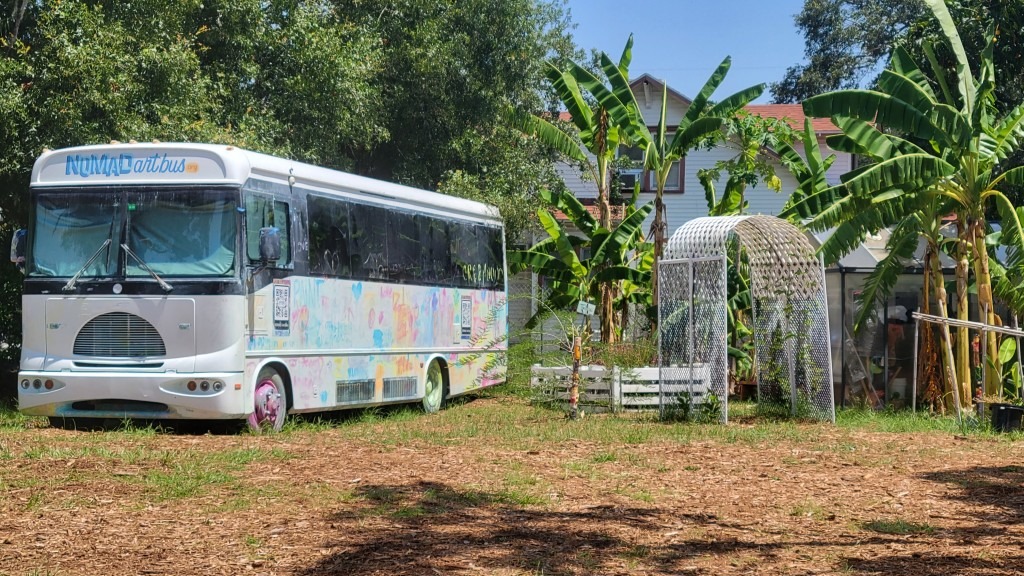
Youth with disabilities or sensory difficulties have had improvement in mental wellness by the touch of the soil and the accessibilities provided by the Farm, she adds. As a person with sensory issues and Attention Deficit Hyperactivity Disorder (ADHD), interacting with the plants and natural elements at the farm brought tranquility to my soul, even with airplanes flying over the area often. It felt safe and comfortable throughout my stay. I was reminded how I used to feel this way in the Filipino islands. I needed that memory back this year more than ever.
Cuban oregano and collard greens, for example, are harvested for pesto to give the community access to fresh whole foods. She laughs remembering teenagers at the farm raving about the Cuban oregano they get to eat with their potato chips, and pointing something out to them with amusement – “You’re going to mess with your profits because you’re eating up your profits. . .”
She adds that in contrast to cultures around the world that consider food as healing medicine and sacred, America puts food at the bottom of its concerns.

Miss Bristol mentions the mini gardens SPYF offers to the community and Tampa Bay – planting 4 or 5 plants in a one-square-foot milk crate, for people to take home and grow their own food.
The goal is to battle food insecurity with her volunteers from all of St. Pete — including YMCA students and a local Mosque — helping, and to teach young people how to be agriculturally savvy by growing seedlings at the Farm and taking them home to sustain their families.
The seeds that St. Pete Youth Farm offers for food accessibility to the community come from receiving wisdom from a local elder on how essential it is to care for the responsibility of feeding ourselves and people who are here and who may come into this life.
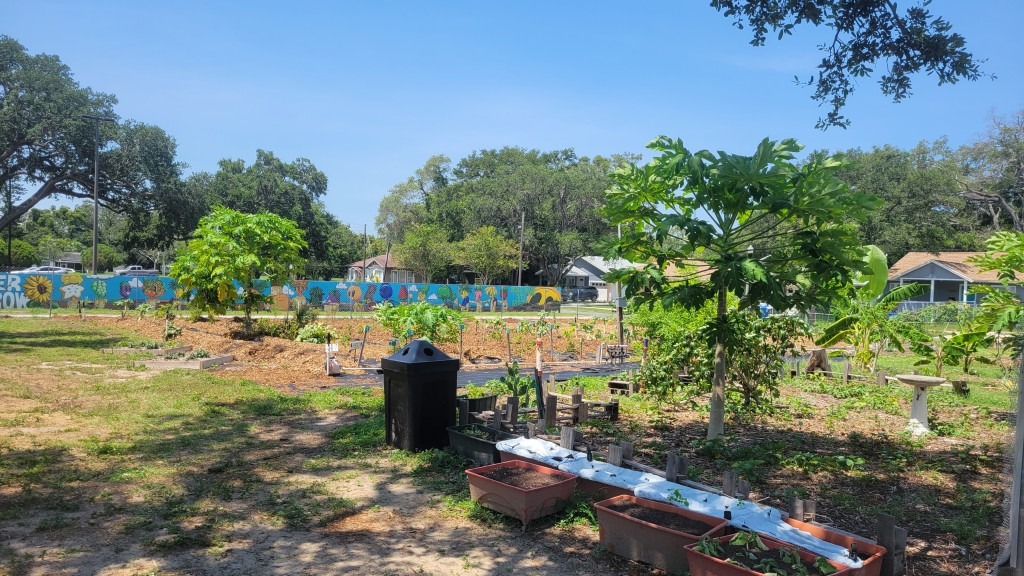
St. Pete Youth Farm grows a variety of fruit and vegetable crops, like cranberry hibiscus and passion fruits, but one stood out to me. Her name is Natasha, a tamarind plant who was transferred to the Farm in an urgent state of losing her life but transformed into an exceptionally healthy plant that’s named after Miss Carla’s sister, who was not able to live after being born.
Miss Carla shows me her okras. Folks, these okras look alive after being harvested! They are greener and larger than you can ever imagine. I want to take some home to make some stew.
I knew from the looks of the okra that Miss Carla puts all of her love into this farm and the people involved. She tells me everyone’s story as much as she can and expresses how she participates in their cultures to show her love and respect for them.
Not only that, but she has given all the teenagers an opportunity to write about their experiences and to actively cultivate their goals.
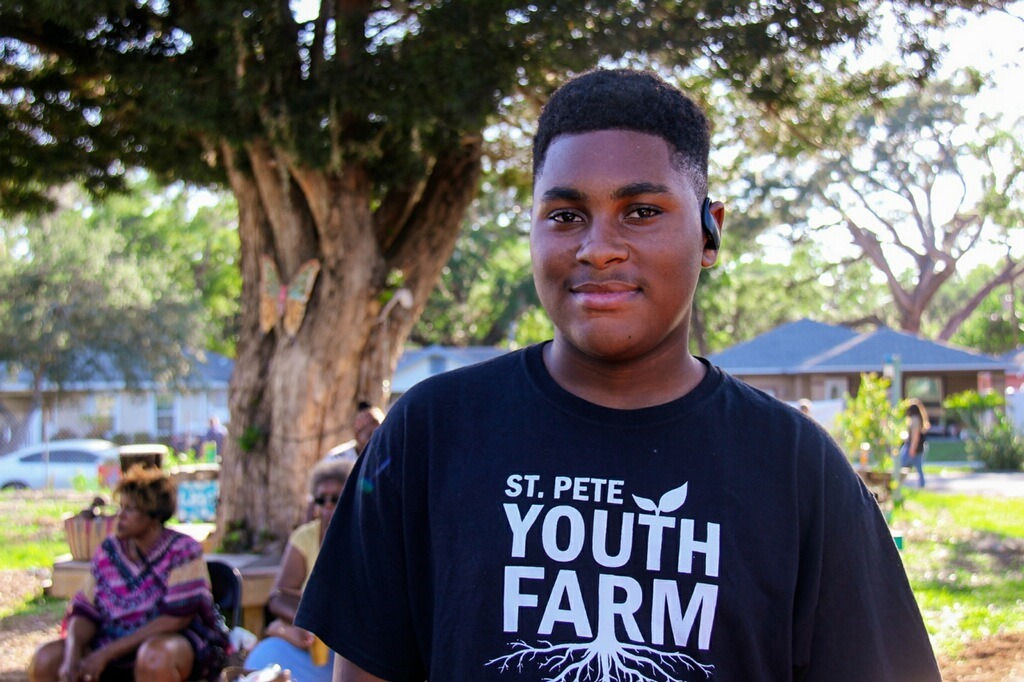
If there is anything I learned from being on this farm for 5 straight hours, feeling energized, welcomed and motivated, just being present…
– Excellent people with brilliant, creative and good hearts, still exist here in Tampa Bay even if they aren’t always in the news.
– There are little pieces of paradise in our local neighborhoods if we just look a little closer and ask, and put in the work to invite others into that paradise.
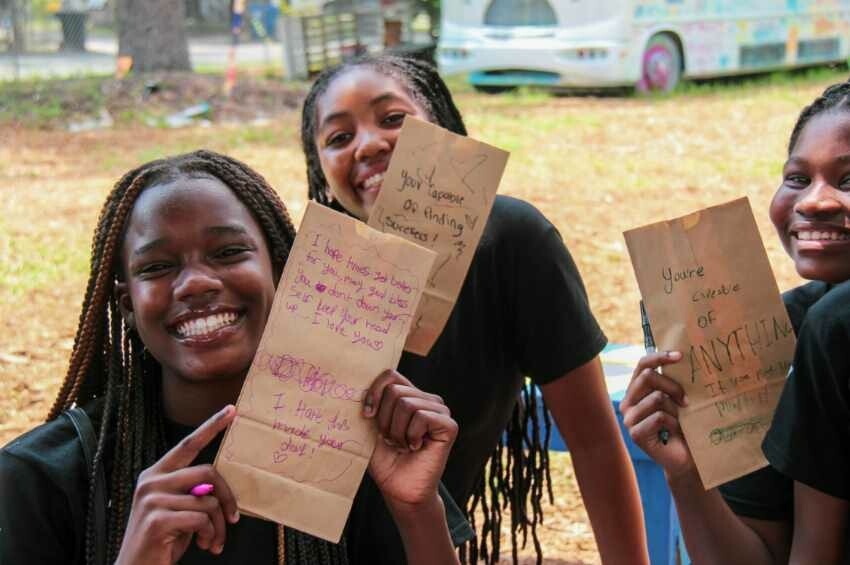
Miss Carla Bristol calls me her little sister at the end. We exchanged our thoughts and our love through conversation and hugs that brought honesty and closeness between two sisters – something I have been yearning for during my stay here in the United States. I call that a miracle she never knew that I’d been waiting for.
This is a personal note – Thank you, Miss Carla, for nourishing my soul.
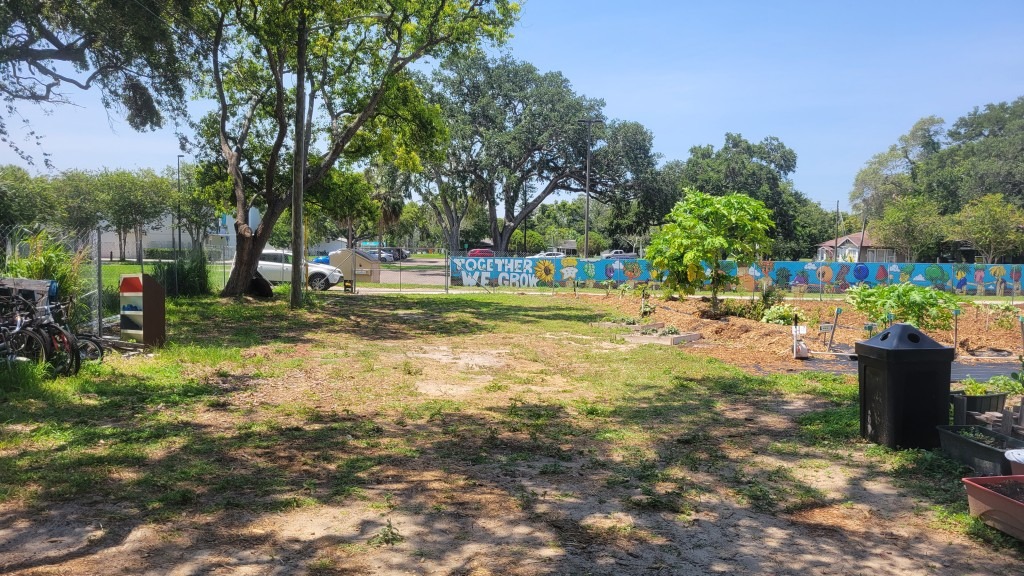
I am confident that the St. Pete Youth Farm will bring a smile to anyone who visits. Miss Carla has a lot to share — not just the food, but the love of everyone’s incredible journey and the fruits of their labor.
Just remember this – invest in those who are investing in you with love in mind. You might start seeing what life is really all about, and start living with purpose until the end of this physical journey.
You can find classes, workshops
and volunteer opportunities
at stpeteyouthfarm.org
